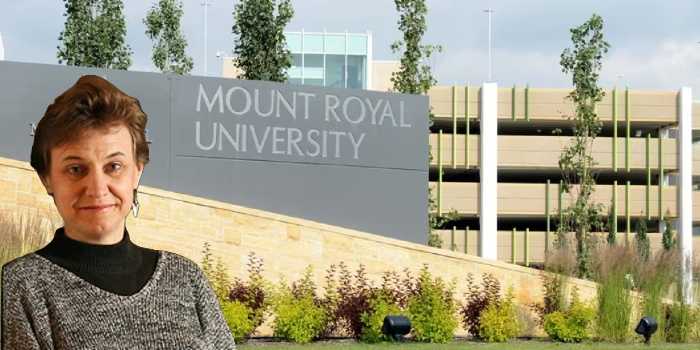By Colin Alexander ——Bio and Archives--August 13, 2023
Canadian News, Politics | CFP Comments | Reader Friendly | Subscribe | Email Us

When will churchman-arbitrator David P. Jones get around to delivering a decision in the dispute between fired university professor Frances Widdowson and Calgary’s Mount Royal University (MRU)? Does Mr. Jones have an interest in burying a case impinging on his own interests and affiliations?
There was widespread publicity when MRU fired the tenured Professor Widdowson in 2020. Her offence? She criticized the Black Lives Matter movement whose rioters wrecked billions of dollars worth of property in the US and destroyed many black businesses. She also said that Indigenous Residential Schools (IRS) benefited many attendees.
Whatever the validity of assertions that there was abuse at some residential schools, as at any boarding school, it’s worth mentioning a couple of former attendees who became world-famous. There’s the Indian architect of Ottawa’s Museum of History and Inuit thoracic surgeon Noah Carpenter. Born on the trapline, Dr. Carpenter graduated from high school in Inuvik in 1963, before progressive education took over
So where does Dr. Widdowson’s case go now? Many a reasonable and informed outsider knows that arbitration can be even less trustworthy than going to court. Worse, proceedings are held in secret—that is, not open to public view as court trials are. A lawyer who articled at the Supreme Court told me of colleagues giving up on doing arbitration because they couldn’t have it on their conscience to continue in that exploitative line of business.
This preamble leads me to say that I’ve written to Mr. Jones, asking these questions:
The following references led me to ask the second of these two questions:
Having been until recently Chancellor of the Anglican Church, Mr. Jones’s position resembles, I believe, that of Lord Hoffmann. He will have been involved with the Anglican Church in relevant issues that MRU espouses but which Dr. Widdowson contests. The complete text of the Truth and Reconciliation report provides solid evidence for more balanced views than people hear about. That said, inventing lurid stories of murders, disappearances and mass graves has become its own game of whacking the piñata. The Anglican Church has thrown under the bus the hundreds of dedicated people, many of them Indigenous, who served their schools devotedly. Both the Church and MRU have, then, been proactive accessories to the promotion of falsehoods and calumny.
Mr. Jones’s biography says he guided the establishment of Canon XXII to give shape to the self-governing Indigenous Sacred Circle. The presumption is, therefore, that he personally delivered counsel to the Primate to endorse the Indigenous assertions espoused by MRU, and by his Church, that Dr. Widdowson disagrees with.
Retired Roman Catholic Bishop Fred Henry recently had the decency to question the propaganda promoted by the Indigenous grievance industry and accepted mindlessly by Mr. Jones’s Church and MRU. Countering assertions that hundreds of IRS attendees went missing, there exists not a single name that’s not accounted for. Not one. Nor has anyone found a single body buried in the orchard next to the Kamloops IRS where there were said to be 215 burials. Because there aren’t any. Only drainage tiles installed in 1924 that showed up on ground-penetrating radar as disturbances.
In sum, I am a reasonable and informed outsider who is questioning Mr. Jones’s capacity for impartiality for the adjudication of this case—or even for timeliness. I should say that I did not consult with Dr. Widdowson or with anyone at MRU about my writing to Mr. Jones.
• Professor Frances Widdowson vs. Calgary’s Mount Royal University
View Comments
Colin Alexander was publisher of the Yellowknife News of the North. His forthcoming book, to be published soon by Frontier Centre for Public Policy, is Justice on Trial: Truckers Freedom Convoy and other problematic cases.